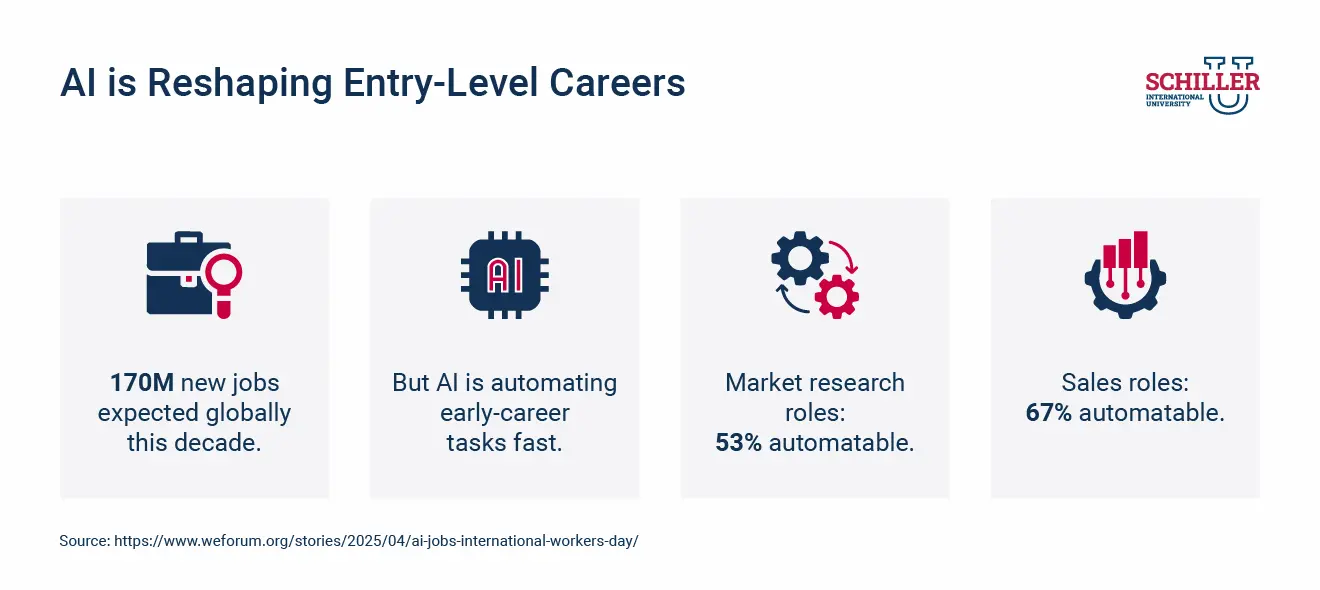Artificial intelligence (AI) is changing what entry-level careers after completing a bachelor's degree look like today. Many of the roles young graduates once relied on are changing fast. AI-powered tools are also automating a significant share of early-career tasks, even as 170 million new jobs are projected to be created globally this decade. Bloomberg estimates that 53% of work done by market research analysts and 67% done by sales representatives could soon be automated, compared with far lower levels for their managers. No wonder 49% of Gen Z job seekers in the US feel AI has reduced the value of a college education.
In this unstable economy, when you choose an AI degree, it should mean something. It should help you understand the fundamentals behind this technology, which is revolutionizing every industry. A strong AI program should provide you with the skills and clarity needed to find your place in a job market that’s shifting under everyone’s feet. It should teach you to grow with technology instead of being threatened by it.
What is an AI degree?
A lot of people imagine an AI degree as something deeply technical and intimidating. But this bachelor's degree is simply a structured way to understand how intelligent systems learn, make decisions, and solve real-world problems.
Think of it this way: AI is not just about coding or building futuristic robots. It is about teaching machines how to recognize patterns, process information, and help humans work smarter. A modern AI program will help you understand how all of this works. This is not to replace you, but to help you become the kind of professional who knows how to use these tools responsibly. A well-designed AI program grounds you in:
- The foundations of machine learning: You learn how models are built, trained, and improved.
- Neural networks and deep learning: You understand why modern AI can recognize images, translate languages, or summarize documents.
- Data literacy: You learn how to clean, analyze, and interpret real-world datasets.
- Programming: Usually Python, the most widely used language in AI.
- Ethical and responsible AI development: You learn how to identify bias, protect user privacy, and ensure fairness.
- Real-world problem solving: You learn to think like an engineer, researcher or strategist.
These are skills that go far beyond entry-level roles and prepare you for a world where AI is woven into every sector, not just technology.
Which skills will you develop?
When you enroll in an AI degree, you will gradually build a set of both technical, analytical, and soft skills. These skills will teach you how to find the perfect balance between AI technology and humans.
Technical Skills
These are the core technical skills you will use to build or apply AI systems:
- Python programming
- Data modelling and analysis
- Machine learning algorithms
- Deep learning frameworks (TensorFlow, PyTorch)
- Cloud computing basics (AWS, Azure, Google Cloud)
- Data visualization tools
- Foundations of cybersecurity powered by AI
- Natural Language Processing (NLP)
- Computer vision basics
Soft Skills
These skills will help you stand out from your peers and make you employable not just in the AI field, but in business, consulting, healthcare, and any sector undergoing digital transformation. They will enable you to:
- Break down complex problems.
- Work through uncertainty.
- Think critically and ask the right questions.
- Communicate technical ideas simply.
- Collaborate on interdisciplinary projects.
- Understand how technology impacts people.
Why These Skills Matter Today
These technical and soft skills are important today because traditional entry-level jobs, even in the technology sector, are becoming increasingly scarce. Employers now look for graduates with AI degrees who can:
- Work with AI tools confidently.
- Analyze data rather than only collecting it.
- Add value beyond repeatable tasks.
- Adapt quickly as technology evolves.

What Entry-level Jobs Can You Go for with an AI Degree?
AI may seem like a field for experts with extensive experience, but there are many viable entry-level roles for recent graduates, with practical, real-world applications of AI across various industries. These roles exist across various industries, including technology companies, financial institutions, hospitals, creative agencies, retail, logistics, and startups.
1. AI Data Analyst
You will work with datasets, prepare them for modelling, and extract insights that help teams make better decisions. It is the perfect starting point.
2. Machine Learning Engineer (Junior)
You will support engineers in building, testing, and deploying AI models. This is one of the most in-demand roles globally.
3. AI Engineer (Entry-Level)
A broader role where you help integrate AI solutions into products or workflows.
4. Data Scientist (Associate/Graduate Level)
You will experiment with models, test hypotheses, and support predictive analytics work.
5. Business Intelligence Analyst with AI Focus
You apply AI-powered tools to support decision-making, financial modelling, or customer insights.
6. AI Product Assistant/AI Consultant (Junior)
If you like strategy more than coding, this lets you work with product teams to shape how AI tools are built and used.
7. AI Ethics, Governance, or Responsible AI Assistant
This is a growing field with moral implications of intelligent systems, especially within regulated sectors such as finance and healthcare.
8. MLOps Assistant (Machine Learning Operations)
You help maintain, monitor, and improve AI systems in production. These roles give you a strong foundation for upward mobility in the next three to five years.
Industries That Actively Hire AI Graduates Beyond Big Technological Firms
One of the biggest misconceptions is that AI jobs only exist at Google or Microsoft. The truth is that almost every industry is adopting AI. With an AI degree, you can be employable across multiple industries. You can explore job opportunities after a degree in applied mathematics and AI that give you flexibility and global mobility.
1. Business and Finance
Fraud detection, risk modelling, algorithmic trading, customer insights and financial automation.
2. Healthcare and Biomedicine
Medical imaging, diagnostics, predictive healthcare, and personalized treatment planning.
3. Cybersecurity
AI-supported threat detection, anomaly identification, and predictive defense.
4. Creative and Media Industries
Generative AI tools, content automation, computer vision for film, game development, and design optimization.
5. Manufacturing, Retail and Logistics
Predictive maintenance, robotics, supply chain optimization, and inventory automation.
6. Government, Public Policy and Social Impact
AI for public services, data analysis for governance, policy modelling.
What are further study and specialization options?
Your first degree will help you get in the door, but with a specialization, you can deepen your expertise after your bachelor's degree. A master’s degree or targeted postgraduate certificate, where you will learn about essential emerging AI technologies, can position you for senior roles or highly specialized careers to take your career to new heights.
- Master’s degree in AI, ML, data science, robotics, or an interdisciplinary field combining AI with business, healthcare, and cybersecurity.
- Specialization certificates in deep learning, neural networks, computer vision, natural language processing (NLP), AI ethics, and MLOps.
- Research or PhD route, if you enjoy pioneering work, modelling, and new algorithms, you may aim for a research scientist role.
- Cross-disciplinary combinations, such as AI and finance (for example, AI in fintech), AI and healthcare (including medical imaging and diagnostics), AI and cybersecurity (AI-powered threat detection), and AI and creative industries (such as generative AI and media), are increasingly valuable.
As AI jobs grow, specialization will help you stand out and choose your career path. You can continue to delve deeper into technical modelling or pivot into product, strategy, governance, or a sector specialist role.
Why Global, Multicampus Learning Environment Matters?
For international students, where you study determines just as much of your future as what you study. AI is a global field. The tools, problems, ethics, and opportunities you will encounter vary widely between countries and industries. Learning within just one environment can limit your perspective. Learning in a global setting gives you something a single-campus experience often cannot:
- A broader understanding of how different markets use AI, from finance hubs to creative industries to healthcare systems.
- Exposure to diverse cultures, working styles, and problem-solving approaches strengthen your adaptability.
- Access to networks, internships, and employers across countries, not just in one city or region.
- Practical support systems that understand the needs of international students, including visa guidance, career services, and cross-border opportunities.
At Schiller International University, we take this further through their inter-campus mobility program, which allows students to study in multiple global cities in the US and Europe during their degree. You can seamlessly transfer between campuses in Madrid, Paris, Heidelberg, or Tampa after year 1.
Choosing a degree in AI is a decision to understand technology changing the face of the global workforce. Yes, entry-level roles are shifting. Yes, automation is accelerating. But a well-designed AI program can help you move from uncertainty to capability. It gives you the tools to understand intelligent systems, the confidence to use them well and the clarity to build a career that grows with every wave of innovation.
Explore Schiller International University’s BSc in Applied Mathematics and AI to learn, master, guide, question, and apply AI responsibly.
FAQs
Q1. What are the most in-demand careers for AI graduates today?
Answer: Machine learning engineers, AI engineers, data scientists, NLP specialists, computer vision engineers, and MLOps engineers are among the most sought-after roles.
Q2. Do AI jobs require a strong background in math or coding?
Answer: Yes. But you do not need to be an expert on day one. Most bachelor's degrees in AI start with foundational skills and gradually build technical confidence.
Q3. Can international students build AI careers outside of their home countries?
Answer: Absolutely. AI roles are globally in demand, and graduates with strong portfolios and cross-cultural experience often find opportunities abroad.
Q4. Which industries are hiring the most AI professionals?
Answer: Apart from the technology industry, healthcare, finance, cybersecurity, retail, manufacturing, the creative industries, and government agencies are among the largest recruiters of AI graduates.
Q5. What is the expected salary range for someone with an AI degree?
Answer: Entry-level AI roles typically offer competitive salaries, with significant growth as you build experience and specialize.

 Request information
Request information









